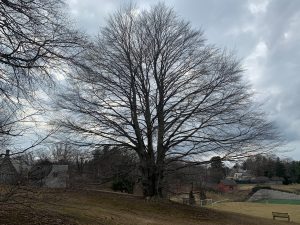(1994)
In July 1991, I was invited to teach at a Jewish Renewal retreat on the campus of Bryn Mawr College. My class was studying Jewish texts about the environment and expressing our relationship with the earth through music. One day, after saying my afternoon prayers, I turned to behold a magnificent beech tree. Drawn to approach her, I embraced her wide trunk, gazed up into her branches, and a question emerged: Do you have a song for me? To my delight and wonder, I heard a simple chant on the Hebrew word for love, ahavah. It was as if the tree were emanating love to me, and to all of humanity. And later, I realized this message was from all the trees, from all of creation, singing love.
In light of the Climate Crisis we now face, the beech tree’s ahavah chant reminds us that love is the path for healing the earth. Jewish tradition teaches that an all-pervasive love constantly flows from the Creator, sustaining life on earth. Can we return this love? Can we live in harmony with the earth and with each other and repair our broken home? The ahavah chant, along with texts from Deuteronomy that call us to love but warn of destruction if we turn away, became the focus for this choral symphony: Ahavah (Love).
A dramatic Sh’ma (hear/listen) introduces the first movement. I interpret Sh’ma here as a call to pay attention, and to remember that the entire universe is one grand Divine energy pulsing with love. The music softens into v’ahavta, “and you shall love,” leading to the ahavah chant over lush orchestral harmonies which invite us to enter the flow of love and unity. This movement expresses gratitude for the abundant blessing of our earth home which has sustained us throughout generations.
The second movement, Hishamru (Beware) warns of the consequences of turning away from the Divine flow and wisdom. We go astray with needless hate and greed, stymied by divisiveness and unwilling to give up harmful actions that are destroying the very ecosystem which sustains us. A strident musical language of chromatic harmonies and jagged percussive outlines conveys the dire prediction of the text: we will be cut off from the loving abundance, the earth will dry up, food will not grow, we will not survive.
The final movement, V’samtem (Place these words), returns to the promise of blessing and sustenance. As the mezzo soprano sings a soothing melody over quietly pulsating strings, the ahavah chant again weaves through. This music expresses my prayer that we remember our inherent unity and heal our precious home planet with love. May the blessing “that you may live, you and your children, on the land which G-d gave to your ancestors, for as long as the heavens are over the earth,” be fulfilled. Ahavah…
I drew on teachings from Rabbis Arthur Waskow and Zalman Schachter-Shalomi in interpreting the text.
Ahavah was premiered by the South Carolina Philharmonic, Nicholas Smith, conductor, with the Columbia Choral Society, Larry Wyatt, director, and Jena Eison, mezzo-soprano soloist. It was later recorded by the conductor Kirk Trevor and the Slovak Radio Symphony Orchestra and Slovak Philharmonic Chorus with Jennifer Hines, mezzo soprano, and released on Albany Records’ Streams in the Desert (Troy 973).
Text and translation:
1. Sh’ma v’ahavtah (Hear and love)
Sh’ma Yisrael: Adoshem Elokeinu, Adoshem echad.
Listen, Israel: the Eternal is our God, the Eternal alone.
V’ahavta et Adoshem Elokecha v’chal l’vav’kha uv’chal nafsh’cha uv’chal m’odecha.
And you shall love the Eternal your God with all your heart, with all your soul, with all your might.
Ahavah (love)…
2. Hishamru (Beware)
Hishamru lachem pen yifteh l’vav’chem v’sartem
Beware lest your hearts be swayed and you turn astray,
va’avadtem elokim acherim v’hishtachavitem lachem,
and you worship alien gods and bow to them,
v’chara af HaShem bachem.
and the anger of the Eternal will rise against you.
V’atzar et ha-shamayim. V’lo yihyeh matar.
The heavens will shut. There will be no rain.
V’ha-a-da-mah lo titen et y’vulah.
The earth will not yield food (produce).
Va-ava-d-tem m’hey-rah.
And you will soon die (vanish).
Sh’ma.
Listen.
3. V’samtem (Place these words)
Place these words upon your heart, and teach them diligently unto your children. Bind them on your hand, place them between your eyes, speak of them at home or on the way. Ahavah…
Write them on your doorposts and upon your gates. So that you may live, you and your children on the land which God gave to your ancestors. Ahavah…
For as long as the heavens are over the earth. Ahavah…
Notes and translation by Meira Warshauer
To view the Piano/Vocal Score, click here.
Listen and View the Score

